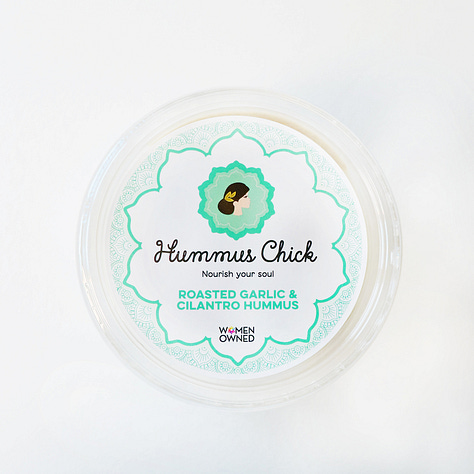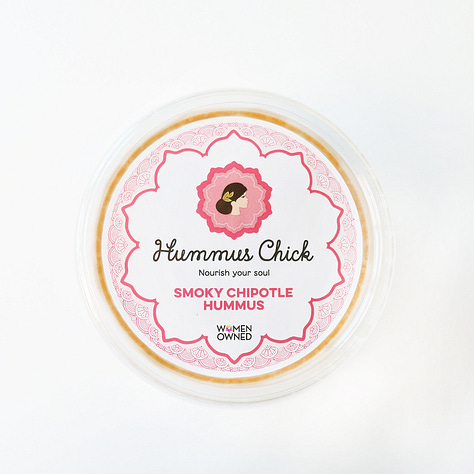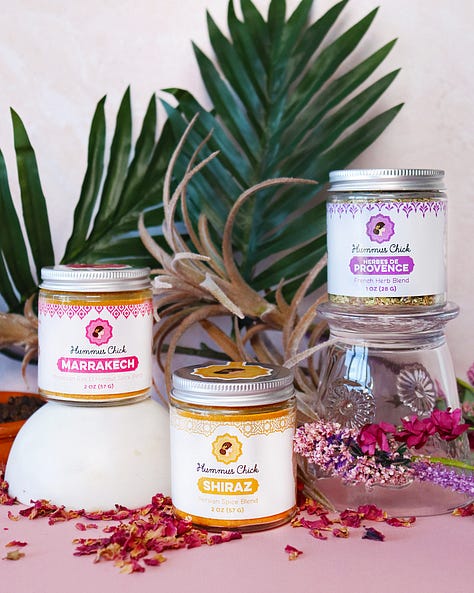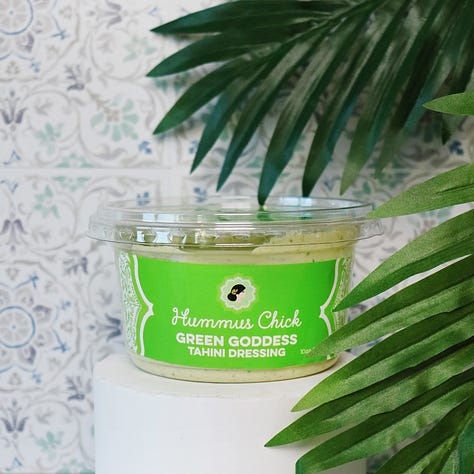From hobby to Whole Foods: How this Nashville immigrant got her hummus into big box retailers
Hummus Chick lines the shelves of Whole Foods, Kroger and 300 other grocers and eateries

To most, hummus is a snack that pairs well with pita chips, but to Java Hemmat, the protein rich puree is much more. It’s the American Dream.
The 43-year-old UAE immigrant has spent the last 11 years building her brand — Hummus Chick. Today, her hard work lines the refrigerated shelves of Whole Foods, Kroger and 300 other grocery stores and eateries.
Hemmat’s journey has been far from smooth. Like many immigrant entrepreneurs, she struggled to make ends meet, juggled multiple jobs and slept seldom in the early days of her endeavor.
Coming to America
20-year-old Java left the UAE and made her way to Murfreesboro in 1998 to attend Middle Tennessee State University. Two months into her school year, Hemmat says, she began to feel fatigued.
“I felt like my energy was zapped,” says Hemmat. “I experienced brain fog for the first time in my life.”
The freshman realized it was the food. She was consuming cafeteria food full of fat, oil and enough sodium to shrink a snail.
“I didn’t have any other choice,” says Hemmat. “My dorm didn’t have a kitchen and I didn’t have a car to go get groceries. Fresh foods weren’t accessible like they are now.”
In May, Hemmat headed home for summer break. She took the time to learn how to cook. The soon-to-be-sophomore would be living in an apartment off campus in the fall and planned on making most of her meals at home.
Hemmat became her mother’s sous chef, assisting and watching closely over her shoulder as she prepared food for the family.
The hobby is born
Hemmat returned to MTSU. She put what she learned into practice. During the week, the business major was a regular Rachel Ray and was whipping up “quick, nutritious” 30 minute meals. But on the weekends, she experimented with new recipes. Her roommates were the guinea pigs.
“This was way before TikTok, Instagram or even online recipes,” says Hemmat.
She relied on old-fashioned, physical cookbooks and handwritten recipes faxed from her mom, who often mailed her hard-to-find spices like tamarind, saffron and mint to make middle-eastern dishes.
“Cooking became a hobby and entertaining became an escape,” says Hemmat. “Through food, I forged friendships and made memories that will last lifetime.”
In the fall of 2001, Java made hummus for one of her feasts. The traditional middle-eastern appetizer, a concoction of chickpeas, spices and oil, was foreign to her friends. Only one had ever even heard of hummus.
“Hummus didn’t become mainstream until about 2015,” says Hemmat.
She served the savory starter with homemade pita bread. The response was overwhelming. Her guests requested that hummus become a regular in the dinner rotation.
Hemmat graduated in 2002 and took a job with Enterprise Rent A Car. She quickly climbed the company ladder and became the Manager of the Charlotte Pike location.
The financial crisis brought Hemmat’s career to a screeching halt. The 31-year-old was laid off in February 2009.
Rocked by the recession layoff, Java says she sought out a more stable profession: medicine. That meant going to grad school. She began pursuing a Masters in Chemistry at MTSU. The program would prepare her for the MCAT.
Soul search
Two years into her studies, Hemmat went through a mid-masters crisis. She questioned if a career in medicine was really going to make her happy. In the summer of 2011, the 33-year-old grad student packed her suitcase and set out on a soul search in Laguna, California.
Sitting on a surfboard, she thought about how to blend her business background and the memories she made cooking for her friends at MTSU. It hit her: Hummus Chick.
Hemmat hurried back to the hotel and put her ideas on paper. On a yellow legal pad, she scribbled down three things:
Hummus Chick- The name of her company
Flavors- Roasted Garlic & Cilantro, Original, Smokey Chipotle
Stores- Whole Foods and Kroger
Hemmat didn’t waste any time. The morning after she touched down in Tennessee, she drove to the county clerk’s office to purchase a business license.
“I had exactly $40 in my checking account,” she says. “A business license was $35.”
The sunburnt, aspiring entrepreneur, headed to her shift Starbucks. She proudly paraded the piece of paper around to her fellow baristas, who became her first customers, ordering 6 containers of hummus on the spot.
Creating a commercial product
But it would be almost a year before Hemmat sold another container. If she wanted to sell her creamy concoction in farmers markets, festivals or grocery stores she would have to create a proper commercial product.
“There are strict food preparation rules and specific labeling and packaging standards,” says Hemmat.
Commercializing a consumer packaged product is costly and time consuming. It’s even more costly and time consuming when you’re an immigrant.
On average, people spend $33,547 to create a consumer packaged product. This includes commercial kitchen fees, packaging, machinery and ingredients.
Juggling two full time jobs, Hemmat had little time, and with $350/hour immigration attorney fees even less money. She was still trying to become a citizen.
“Nannying paid for me to live and Starbucks essentially paid my attorney,” Java says. “I remember I only made $15,000 that year.”
But Hemmat hustled, and made it happen.
First farmers market
In May 2012, she set up shop at her first outdoor market: the Richland Farmers Market. She was selling the 8 oz containers for $6.
Many at the market had never heard of hummus, and, “...if they had…it was a family member who had gone to Israel”. Hemmat offered samples of her spread with carrots and crackers. Customers clamored and cleaned her out of the 30 containers she brought within the first hour of the three hour market.
The following Saturday she doubled the amount of dip. She thought 60 containers would surely suffice. She was wrong. Her coolers were empty within an hour-and-a-half.
Hemmat nannied until 6:00 p.m. each day. From the family’s home, Hemmat headed to Mesa Kemal — a commercial kitchen for immigrant entrepreneurs — to make her hummus for the weekend markets.
“Hummus Chick wouldn’t have been possible without Mesa Kemal,” says Hemmat, “At the time most commercial kitchens were charging $25/hour, I was spending 8-9 hours, 3 days a week making hummus. That would have been $2,400 a month. I couldn’t afford that. Mesa was a flat fee of $350 a month.”
She worked into the wee morning hours. Often leaving at 2 or 3 a.m. Most days she says may have slept 3 or 4 hours, before heading to her babysitting job.
By the end of 2013, Hemmat was hawking her hummus at 5 Nashville farmers markets: Richland, Donelson, 12th South, and two on West End.
2014 was a pivotal year for Hemmat. She traded her daytime babysitting gig for an overnight one. This allowed her to spend more time on her business during daylight hours.
“It was important that I could call and meet with potential clients — grocery stores, coffee shops, juice bars, etc when they were open,” says Hemmat.
She also called Starbucks quits. No more making macchiatos. She became the manager of Mesa Kemal’s kitchen. After all, when she wasn’t making sales calls, she was making hummus. A lot of hummus. Each week, Hemmat says, she would prepare anywhere from 100 - 200 pounds of hummus.



Whole Foods
Word spread and soon everyone had heard about the “hummus chick” including the local liaison for Whole Foods local program. The representative approached Hemmat at the 12th South Farmers Market and asked if she would be interested in learning about the program.
“I wasn’t going to wait for a meeting,” says Hemmat.
She showed up at the Hillsboro Whole Foods the very next day. She agreed on the spot to a deal, but like any good thing, it took time and “a lot of paperwork”.
Hemmat had to edit her containers to adhere to the Amazon-owned store’s specific standards. A year after that initial meeting, in December 2015, her middle eastern mash made it on the refrigerated shelves at the location in Hill Center. It was opportune timing. Hummus was taking the snack scene by storm. Sabra, which is owned by Pepsi, made the protein-rich puree mainstream. Peppers, pretzels, pita chips…people started to dip everything in the cool, creamy condiment.
By 2016, she had placed her product on the shelves of more than 50 different retailers and in the coolers of 100 cafes.
Hauling hummus in the Honda
Hemmat had another big break. Her hummus was selling so well that Whole Foods asked to carry it in its Atlanta locations.
There was only one problem. She didn’t have distribution.
But Hemmat was hungry to succeed, and would do whatever it took, including delivering it herself. Every Wednesday, she would wake at 2:00 a.m. and haul her hummus to Atlanta. She crammed coolers into the back of her Honda civic and made the 3.5 hour trek.
Hemmat hung up her delivery hat in the fall of 2020. She finally had distribution. She needed it now more than ever. Whole Foods wanted her hummus in California, Kansas and Texas locations.
A new obstacle arose during this time: Covid. Costs increased across the board in almost every industry. Hemmat’s hummus was not immune. She says her costs increased 34-percent in 2021. Hemmat had no other choice but to increase the price of her hummus. But the price hikes didn't deter anyone. In fact, Hemmat’s sales soared 145%.
Hemmat’s success has continued and expanded beyond hummus. Hummus Chick now has a line of Mediterranean spices and offers an assortment of tahini dressings. These products haven’t made it into Whole Foods — “yet” says Java — but are available at select specialty retailers — including Turnip Truck (West, East and Gulch locations), Produce Place and Hendersonville Produce — and online.



Like her hummus, she says success is better when it's shared with others. She credits what she humbly and cleverly calls “pea-sized” achievement to those who have supported her along the way.




